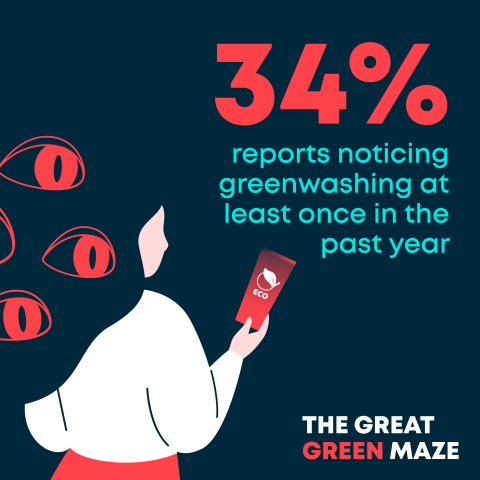Green ads confusing according to new consumer survey - EU rules needed
About this publication
As the COP28 talks are about to kick off, an international consumer survey published today sheds light on the urgency of tackling greenwashing. The survey - carried out by BEUC and ICRT1 in 16 European and non-European countries – looked at consumer perceptions on green claims.*
The survey shows most consumers want to take action to reduce their environmental footprint and look out for reliable information. But they end up frustrated with the confusing, never-ending sea of green labels and claims. The survey reveals that:
-
Close to half of the respondents (48%) prefer buying products bearing an environmental label than products without one.
-
One in three respondents (34%) say they have noticed greenwashing at least once over the past 12 months. Only a mere 3% say they would be able to always distinguish false green claims.
-
Three out of four respondents believe green claims and labels should only be authorised if pre-approved or verified and almost 70% say they trust public authorities and third-party organisations to fulfil that role.
-
Nearly three out of four European respondents think that “very polluting companies” should not be allowed to use any green claims at all.
Monique Goyens, BEUC Director General, commented:
"Consumers need trustworthy environmental information to shift to a more sustainable lifestyle. Our survey clearly shows consumers are not equipped to identify greenwashing. It should not be consumers' job to tell true from false. They expect authorities to make sure claims and labels are reliable in the first place.”
“Understandably, consumers do not properly recognise that while products like food, plastic bottles or plane tickets might be marketed as “carbon neutral” they rely on carbon offsets and still emit CO2.”
“Our study shows consumers are open to stricter measures preventing polluting companies from painting their products green. As the COP28 is about to start, international efforts to prevent false green advertising must catch up with companies’ creativity.”
Niels Ebbe Jacobsen, CEO of ICRT, commented:
"The survey results are broadly similar also in countries outside Europe, where the survey was conducted: the US, Canada, Australia and New Zealand. Consumers feel poorly or not informed at all about the requirements companies must follow to use green claims.”
BEUC’s recommendations to policymakers:
1. Member States should swiftly transpose the progresses made under ‘Empowering Consumers for the Green Transition’ in national law, starting with the ban of carbon neutral claims
2. The EU should adopt the “Green Claims Directive” and ensure it introduces robust pre-approval for green claims and labels while leaving enough room for trustworthy labels
3. Support and promote labels of environmental excellence, such as the EU Ecolabel
4. Reinforce enforcement against greenwashing
5. Accelerate international cooperation to fight against greenwashing.
* BEUC member organisations participating in this action are: TestAchats/ TestAnkoop (Belgium); VKI (Austria); dTest (Czechia); Forbrugerrådet Tænk (Denmark); Tudatos Vásárlók Egyesülete (Hungary); Altroconsumo (Italy); Consumentenbond (the Netherlands); Forbrukerrådet (Norway); DECO (Portugal), Zveza potrošnikov Slovenije (Slovenia); OCU (Spain), Sveriges Konsumenter (Sweden). Added to this our international colleagues of CHOICE (Australia); Consumer NZ (New Zealand); Consumer Reports (USA) and Protégez-Vous (Canada).
Documentation:
Report with main findings and conclusions
Main findings of each European country
* Euroconsumers contributed to developing the questionnaire and carried out the data collection and statistical analysis. Gathering five national consumer organisations and giving voice to a total of more than 1,5 million people in Italy, Belgium, Spain, Portugal and Brazil, Euroconsumers is the world’s leading consumer cluster in innovative information, personalised services and defence of consumer rights. Its European member organisations are part of the umbrella network of BEUC, the European Consumer Organisation. Together they advocate for EU policies that benefit consumers in their daily lives.
1 International Consumer Research & Testing (ICRT) is a global consortium of consumer organisations that work together on research and testing of consumer products. ICRT works as a not-for-profit organisation fully owned by its members. It is independent of product manufacturers and acts exclusively in the interest of the consumers.
ENDS
Download:

